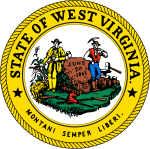| ||||||||||||||||||||||||||||||||||||||||
17 of 34 seats in the West Virginia Senate 18 seats needed for a majority | ||||||||||||||||||||||||||||||||||||||||
|---|---|---|---|---|---|---|---|---|---|---|---|---|---|---|---|---|---|---|---|---|---|---|---|---|---|---|---|---|---|---|---|---|---|---|---|---|---|---|---|---|
| ||||||||||||||||||||||||||||||||||||||||
Holds and gains Democratic gain Democratic hold Republican hold
| ||||||||||||||||||||||||||||||||||||||||
| ||||||||||||||||||||||||||||||||||||||||
| Elections in West Virginia |
|---|
 |
The 2006 West Virginia Senate election took place on Tuesday, November 7, 2006, to elect members to the 78th and 79th Legislature. 17 of the 34 state senate seats were up for election. State senate seats in West Virginia are staggered, with senators serving 4-year terms. [1] The election took place concurrently with the U.S. House and U.S. Senate elections. The Democratic Party won over 60% of the vote for state senate candidates and picked up 2 seats held by Republicans, retaining their supermajority. [2] While President George W. Bush won the state in the previous presidential election, Democrats did well across the country and the state in a year described as a blue wave. [3]



